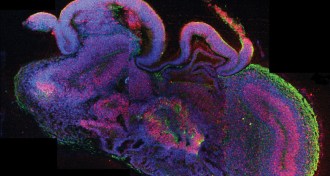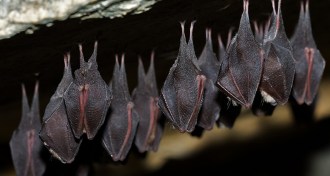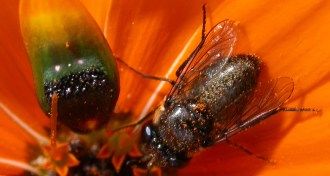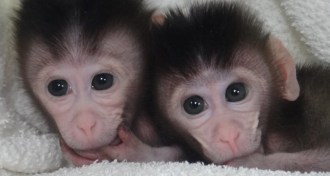Search Results for: mutations
Skip to resultsCan’t find what you’re looking for? Visit our FAQ page.
2,461 results for: mutations
-
 Humans
HumansDNA reveals details of the peopling of the Americas
Migrants came in three distinct waves that interbred once in the New World.
-
 Life
LifeTiny human almost-brains made in lab
Stem cells arrange themselves into a version of the most complex human organ.
-
 Life
LifeMany genes in dolphins and bats evolved in the same way to allow echolocation
Widespread changes scattered across the genomes of distantly related species cooperated to craft the trait.
-
 Animals
AnimalsTiger, lion and domestic cat genes not so different
Genomes of big felines provide insight into their evolution.
-
 Humans
HumansLetters from the October 20, 2007, issue of Science News
Well, read Margit L. Bleecker appears to have discovered that those who score highly on reading tests also score highly on tests of memory, attention, and concentration (“How reading may protect the brain,” SN: 8/18/07, p. 110). I don’t find that highly surprising. Ivan MannHoover, Ala. How it happened stance “Alien Pizza, Anyone?” (SN: 8/18/07, […]
By Science News -
 Plants
PlantsDastardly daisies
This flower isn’t just any old sex cheat. It can be sexually deceptive three ways and in 3-D.
By Susan Milius -
 Genetics
GeneticsMonkeys born with edited genes
A DNA-snipping technique inspired by bacteria shows therapeutic promise.
-
 Neuroscience
NeuroscienceDiuretic may treat autism, study in rodents suggests
Drug that lowers chloride levels in brain cells staves off symptoms in mice and rats.
-
 Health & Medicine
Health & MedicineA chink in flu’s armor
Finding the shape of a protein that enables the flu virus to replicate points to ways to combat the disease.
-
 Life
LifeMaking T cells tougher against HIV
Delivering small interfering RNAs, or siRNAs, to human immune cells in mice protects the cells from HIV and suggests future therapy for patients.
-

-
 Chemistry
ChemistryFBI reveals more details of anthrax investigation
A panel of scientists involved in the anthrax investigations released new details.